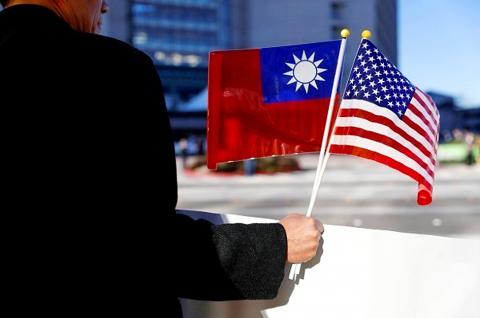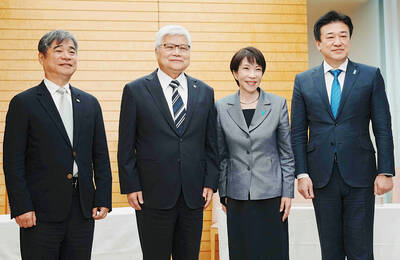The US House of Representatives on Tuesday passed the Taiwan Assurance Act of 2019 and House Resolution 273 reaffirming the US’ commitment to Taiwan and the implementation of the Taiwan Relations Act (TRA).
The Taiwan Assurance Act was passed without objection, while the resolution was carried in a vote of 414 votes in favor, zero against and 17 abstentions.
“It is the sense of [the US] Congress that Taiwan is a vital part of the United States free and open Indo-Pacific strategy,” the Taiwan Assurance Act reads.

Photo: Reuters
The US should “conduct regular sales and transfers of defense articles to Taiwan in order to enhance its self-defense capabilities, particularly its efforts to develop and integrate asymmetric capabilities, including undersea warfare and defense capabilities, into its military forces,” it says.
In the fourth section on “Taiwan’s Inclusion in International Organizations,” the Taiwan Assurance Act says that it is US policy to advocate for the nation’s “meaningful participation” in international bodies “as appropriate,” giving as examples the UN, the World Health Assembly, the International Civil Aviation Organization and the International Criminal Police Organization, commonly known as Interpol.
It is also US policy to advocate for Taiwan’s membership in the Food and Agriculture Organization, UNESCO and “other international organizations for which statehood is not a requirement for membership,” it says.
It requires the US secretary of state to review the US Department of State’s guidance governing relations with Taiwan, including its “Guidelines on Relations with Taiwan” and other documents, and to reissue the guidance to the US government’s executive branch departments and agencies within 180 days of enactment.
Meanwhile, the resolution says that the TRA and the “six assurances” have been “essential components in helping to maintain peace, security and stability in the Western Pacific,” and are “cornerstones” of US policy toward Taiwan.
The House encourages mutual visits between US and Taiwanese officials, per the Taiwan Travel Act that was signed into law in March last year, the resolution says.
It also reiterates that the US president should conduct “regular transfers of defense articles to Taiwan consistent with Taiwan’s national security requirements in accordance to prior legislation.”
It calls on the secretary of state to “actively engage internationally in support of Taiwan’s meaningful participation in international organizations engaged in addressing transnational threats and challenges,” and recognizes Taiwan’s “partnership in combating global terrorism.”
In Taipei yesterday, Presidential Office spokesman Xavier Chang (張惇涵) thanked the House for its support, saying that the passage of the resolution is especially important on the 40th anniversary of the TRA.
Calling the US Taiwan’s “most important partner in the international community,” Chang said that the government’s efforts over the past three years have allowed it to be seen as a reliable partner in maintaining the “status quo” of regional peace and stability.
Taiwan’s strategic importance is no longer restricted to the Taiwan Strait, but now includes the Pacific, he said.
Taiwan would continue to play a role in maintaining the “status quo” of regional peace and stability with its partners, he added.

Right-wing political scientist Laura Fernandez on Sunday won Costa Rica’s presidential election by a landslide, after promising to crack down on rising violence linked to the cocaine trade. Fernandez’s nearest rival, economist Alvaro Ramos, conceded defeat as results showed the ruling party far exceeding the threshold of 40 percent needed to avoid a runoff. With 94 percent of polling stations counted, the political heir of outgoing Costa Rican President Rodrigo Chaves had captured 48.3 percent of the vote compared with Ramos’ 33.4 percent, the Supreme Electoral Tribunal said. As soon as the first results were announced, members of Fernandez’s Sovereign People’s Party

EMERGING FIELDS: The Chinese president said that the two countries would explore cooperation in green technology, the digital economy and artificial intelligence Chinese President Xi Jinping (習近平) yesterday called for an “equal and orderly multipolar world” in the face of “unilateral bullying,” in an apparent jab at the US. Xi was speaking during talks in Beijing with Uruguayan President Yamandu Orsi, the first South American leader to visit China since US special forces captured then-Venezuelan president Nicolas Maduro last month — an operation that Beijing condemned as a violation of sovereignty. Orsi follows a slew of leaders to have visited China seeking to boost ties with the world’s second-largest economy to hedge against US President Donald Trump’s increasingly unpredictable administration. “The international situation is fraught

Taiwan Semiconductor Manufacturing Co (TSMC, 台積電) plans to make advanced 3-nanometer chips in Japan, stepping up its semiconductor manufacturing roadmap in the country in a triumph for Japanese Prime Minister Sanae Takaichi’s technology ambitions. TSMC is to adopt cutting-edge technology for its second wafer fab in Kumamoto, company chairman C.C. Wei (魏哲家) said yesterday. That is an upgrade from an original blueprint to produce 7-nanometer chips by late next year, people familiar with the matter said. TSMC began mass production at its first plant in Japan’s Kumamoto in late 2024. Its second fab, which is still under construction, was originally focused on

GROWING AMBITIONS: The scale and tempo of the operations show that the Strait has become the core theater for China to expand its security interests, the report said Chinese military aircraft incursions around Taiwan have surged nearly 15-fold over the past five years, according to a report released yesterday by the Democratic Progressive Party’s (DPP) Department of China Affairs. Sorties in the Taiwan Strait were previously irregular, totaling 380 in 2020, but have since evolved into routine operations, the report showed. “This demonstrates that the Taiwan Strait has become both the starting point and testing ground for Beijing’s expansionist ambitions,” it said. Driven by military expansionism, China is systematically pursuing actions aimed at altering the regional “status quo,” the department said, adding that Taiwan represents the most critical link in China’s